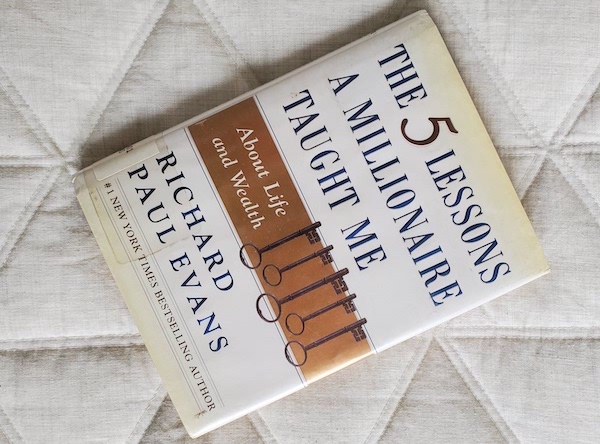I loved this book. It’s one of the few books that I’ve read in a single day. It’s easy to get through and challenges your perspective on plenty of things. Before I returned this book, I wanted to document some of my favorite takeaways in the hopes that I can solidify the things I learned and obviously share them with others! Here are my favorite takeaways from the 5 Lessons a Millionaire Taught Me by Richard Paul Evans.
Lesson 1: Decide to Be Wealthy
This was my least favorite chapter. It talks mostly about how the wrong attitude towards money will keep us from ever accumulating it. (i.e. If you believe money is the root of all evil, you won’t ever be successful in accumulating it because you attribute money with evil.)
It also dives a little bit into the Law of Attraction and the power of the subconscious mind. Touches on the fact that most millionaires don’t flaunt their wealth. Check out The Millionaire Next Door and The Millionaire Mind.
Finally, it wraps up by bringing it all home again with the simple lesson: “Decide to be wealthy.”
Lesson 2: Take Responsibility For Your Money
I’m glad I hung on through the first lesson to get to the second, because this is where we get to the meat and bones. In this chapter, the author gives some practical steps for what and how to take responsibility for our money.
1. Know How Much Money You Have
How do we benchmark our health? Blood pressure, BMI, weight, etc.
Our finances require bench-marking too or else we never know if we are progressing or not. We must calculate our net worth and track it monthly and annually. As the old saying goes, you get what you measure. Measuring our net worth will help align our behavior to make that number increase however possible.
2. Know Where Your Money Comes From
Knowing where our money comes from gives us two great advantages. First, we can decide how to allocate our time more effectively. For example, if we make $100 a week mowing lawns for 10 hours and $500 a week flipping furniture for 10 hours, then we probably should drop mowing lawns and double down on flipping furniture as we make 5x more money per hour flipping furniture!
Second, knowing where our money comes from helps us decide how to use our money. Ongoing expenses like housing and groceries should be paid for using stable income from our jobs. Whereas vacation or extra payments on debt should be used with more infrequent income like bonuses, gifts, inheritances, etc.
3. Know Where Your Money Is Going
Definitely the biggest wake up call of all is that first month where you’ve tracked every dollar and categorized all your spending. If you’re like me, you spent a stupid amount of money on eating out. Like STUPID amount.
This is the part where we figure out where the holes are in our wealth bucket and get them plugged. It’s a critical step because until we lock down our spending, we will never be wealthy. No amount of water fills a bottomless bucket.
4. Know What Your Money Is Doing
Even if you’ve checked the box of the above 3 steps and you’ve got a fat bank account, you’re still losing. Inflation erodes the value of your money every day. Saving is only half the battle. We must also learn how to be good stewards of our money and put it into assets that grow faster than inflation (the speed at which our money loses value). This chapter doesn’t go into detail on how to allocate our savings, but later chapters do.
Lesson 3: Keep a Portion of Everything You Earn
Fix the bottom of your bucket!
Celebrities, professional athletes, lottery winners are all living proof that it does not matter how much money you make. What matters is how much you keep and what you do with what you keep. That’s the name of the game right there.
This chapter is really pretty straightforward. The only other thing it touches on that’s worth mentioning is the decision to tackle debt versus save and invest. The author recommends doing both! (i.e. Paying off your debt and investing at the same time.)
Lesson 4: Win in the Margins
“The wealthy find additional ways to increase contributions to their growing nest egg.”
This chapter should have been called “The Frugal Side Hustler” because it’s all about squeezing extra cash out of every day activities and business endeavors – both new and existing.
To be wealthy, we need to be in the frame of mind of always looking for a new way to generate income. Right there along with looking for ways to increase the income out of our current job, side hustles, etc.
This chapter tells a few stories of how people found unique ways of generating extra income through their 9-5’s or during their evenings and weekends.
4 Key Mindsets That Characterize the Wealth Builder
1. The Millionaire Mentality Carefully Considers Each Expenditure
Is this expenditure really necessary? Or is it possible to get the same personal effect without using money or using less of it?
Use the negotiation tactic as a buyer of asking: “Is that really the best you can do?”
Is this expenditure contributing to my wealth or taking from it?
Is this an impulse purchase or a planned purchase? Am I being pressured to make an expenditure I’m not certain about?
Saving is only half the battle. We must also realize our savings by investing the difference.
2. The Millionaire Mentality Believes That Freedom and Power Are Better Than Monetary Pleasure
Are you spending money to please other people or try to fit in socially? How often do you delay gratification? Do you deserve it?
3. The Millionaire Mentality Does Not Equate Spending with Happiness
The successful nest egger fosters gratitude as a strategy against materialism and unhappiness.
4. The Millionaire Mentality Protects the Nest Egg
Don’t risk what you can’t afford to lose. Don’t give your money to people to manage who haven’t proved themselves capable. It’s ultimately up to you to protect your savings. When you have money, people will come to you with “great business opportunities” and “once-in-a-lifetime” investment opportunities. And these people are often family members. You and you alone are responsible for being a good steward of the money you worked hard to save. Don’t be stupid. Don’t blow it.
Lesson 5: Give Back
“If money becomes what you live for, you will eventually conclude that life is not worth living.”
Ultimately, I guess no one can tell you what you should or should not do with your money. It’s yours. But money is one of those things that ruins people every day. They are either crushed by the weight of debt and lack of money. Or they are crushed by the weight of money itself.
Giving is our ability to free ourselves from the worship of money. From the slavery of it.
I’ll add here that if we don’t give when we have nothing, we won’t give when we have everything. Giving doesn’t have to be money alone. It can be time, expertise, etc. It’s more about the attitude than the checking of a box. I find that automating this process is as essential as automating the process of saving. Life gets busy. We get busy. Give back finances, expertise, time, labor, etc.
My Thoughts on The 5 Lessons a Millionaire Taught Me
I honestly really liked The 5 Lessons a Millionaire Taught Me despite it’s age and relative simplicity. This book doesn’t promise “The Secret to Wealth” as we all know there is no real secret. But I think it’s very well written and worth the read despite my laying out some of the highlights above. My favorite part of the book is the appendix where it goes through tons of side hustle ideas and money saving ideas. I liked this book and would recommend it to others.
You can find The 5 Lessons a Millionaire Taught Me on Amazon (Not surprisingly).
Or rent it at your local library, which I recommend 🙂


